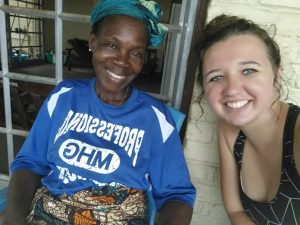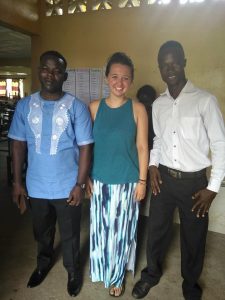My AgriCorps service didn’t end quite like I had planned. At the beginning of May, I was sent back to the states due to noncontagious medical issues that could not be solved in Liberia. Due to health risk, I was forced to leave my site without saying goodbye to my community. I basically went from the hospital to the airport. It was devastating. While I have been home for a few weeks, I still have not been able to completely process my time in West Africa and the consequences of my journey ending with loose ends. I have learned that it is easy for me to unemotionally spit out facts and talk about realities of life there. However, as you can imagine, it becomes far more complicated to discuss experiences, people, or my community without a few tears.
When you are introduced into a community, you become the topic for conversation especially when your skin tone is so much lighter than your community members. There is a shininess that naturally comes from your new presence in the community like a new toy in a chest. Kids not used to lighter skinned people will pinch you to verify that you are not a ghost. Soon after introductions, the newness wears off and you begin to build relationships and find your niche in the community. During my time in Liberia, I made fast friends with community members, school teachers, canteen workers, and of course community kiddos. One of my most special relationships was with the janitor at the library. She is older in age. I would tell you her age, but she doesn’t know it. She knows that she was born June 5, but not what year. Due to local tradition and as a sign of respect I refer to her as a “Ma.” So her name is Ma Alice. This is last picture of us I have. It was taken on a regular day as we were just hand washing some clothes. Doesn’t she have the most beautiful smile you’ve ever seen?
so much lighter than your community members. There is a shininess that naturally comes from your new presence in the community like a new toy in a chest. Kids not used to lighter skinned people will pinch you to verify that you are not a ghost. Soon after introductions, the newness wears off and you begin to build relationships and find your niche in the community. During my time in Liberia, I made fast friends with community members, school teachers, canteen workers, and of course community kiddos. One of my most special relationships was with the janitor at the library. She is older in age. I would tell you her age, but she doesn’t know it. She knows that she was born June 5, but not what year. Due to local tradition and as a sign of respect I refer to her as a “Ma.” So her name is Ma Alice. This is last picture of us I have. It was taken on a regular day as we were just hand washing some clothes. Doesn’t she have the most beautiful smile you’ve ever seen?
I could tell stories about her for hours, but none of them could fully describe how much she radiated love to everyone she met. She gave me the biggest hug every day. She introduced me as, “My Daughter, Leela” to others. She is the woman that taught me to tie lappa and wash my clothes by hand.
I tried since January to take her to the beach. She lives 2 hours from the ocean and has never seen it. One weekend I wanted to take her and she told me she had a workshop and couldn’t go that weekend. Knowing she is the janitor at our library and cleans for all kinds of events, I didn’t think much of it. The Monday after I asked her how the workshop went and if she had to work late. She said “Oh, my daughter, I was in the workshop, not cleaning. I was learning to write my name.” She was smiling so wide, giggling, and practically bouncing up and down with childlike excitement. The simplicity of such a task, purity of her heart, and excitement brings me to tears every time I think of it. Most older people are fluent in Koloqua (Liberian English) and a native language, but many cannot read, write, or understand standard English. Ma Alice and I can barely understand each other in language, but daily she taught me the immeasurable depths of love that can be communicated with a smile, laugh, and hug.
That photo above is one of the last photos we have together, but it was not the last time we washed together.
I never knew the last time would be the last time. I was robbed of such luxury. But, I’m grateful every day that we had time. Isn’t that how life goes? We celebrate, remember and document so well the firsts. First Day of School. First Football game of College. First Kiss. First time to _________. We usually document these special occasions with pictures, but how often do we document the last times. The last time your kid climbs in bed with you before he is too big to do it anymore. The last time we rode our bike with training wheels. The last time we ate at our favorite meal cooked by our grandmother before she passed. It is not that those weren’t important or any less memorable, but we get so excited about what’s next that appreciating what is and soon-to-be was takes the backseat.
Life moved so much slower in Liberia. I have been back in the U.S. for a couple weeks and am blessed with some time to process everything I experienced. Even so, I certainly feel the unspoken American pressure to achieve, produce, and output greatness as quickly and efficiently as humanly possible. I am proud that I have strategically taken time to process my experience. You must understand, a year ago I would have jumped right back in to my old life and not given it any thought. I would have comfortably ignored my discomfort and done my best to expedite the readjustment process. However, the post Liberia version of myself has learned that I must take care of myself. I have learned that my feelings are valid and real, and it is healthy to take time to process. Believe it or not, it is actually quite healthy. ???? That may sound like a rudimentary thing to say, but it honestly has been huge for me.
 I tried to live as presently as possible in every moment in Liberia. Knowing that you have a year long expiration date does that to you. These are a few photos that I took of my leadership students as they completed their 30-minute exit interview exams. I had no idea these would be from the last time I would see them during my service.
I tried to live as presently as possible in every moment in Liberia. Knowing that you have a year long expiration date does that to you. These are a few photos that I took of my leadership students as they completed their 30-minute exit interview exams. I had no idea these would be from the last time I would see them during my service.
Here’s the secret we all too often forget in America. We all have an expiration date that is approaching faster than we know it. My experience helps me live more presently in each moment. I do not want to take a single conversation for granted. I do not want to miss out on the sunset over the horizon. I do not want to miss out on blooming flowers or weeds. I do not want to miss an opportunity to love on those around me. In a country full of material hoarders, I want to be a hoarder of moments and good memories.
I do not want to go through the motions or desensitize myself from reality. I want to be present and fully invested in each moment, so that when the lasts come and go they will be cherished just like the firsts.
The way Ma Alice loved me goes with me every day, even now that I’m home. It’s with me when I hug a friend, go out of my way to serve another, and smile at a stranger. She may be illiterate by all academic standards, but she is distinguished in life. Ma may never be able to read the following paragraph, but she sure lives it out and I hope to do so too as a result of having known this amazing woman.
“I’ve learned that whenever I decide something with an open heart, I usually make the right decision. I’ve learned that even when I have pains, I don’t have to be one. I’ve learned that every day you should reach out and touch someone. People love a warm hug, or just a friendly pat on the back. I’ve learned that I still have a lot to learn. I’ve learned that people will forget what you said, people will forget what you did, but people will never forget how you made them feel.” -Maya Angelo
Megan Harper is an Agricultural Economics graduate from the University of Kentucky. Before becoming an AgriCorps Fellow Megan was a Kentucky State FFA Officer.


